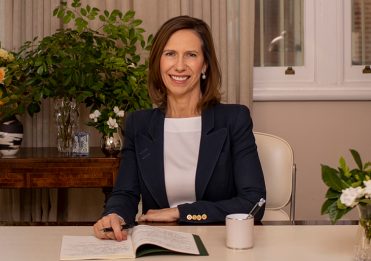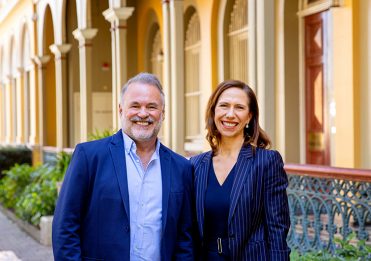The return of all of our students to School has been welcomed and celebrated by the girls, our teachers and parents. Steadily we are resuming most of our usual activities, including a P&F meeting on Monday night. How exciting what we may have, sometimes, taken for granted—simply being together—can again be. A small group of socially-distanced parents and support group representatives (with their individual cheese boards) gathered to plan our response to upcoming events and other modes of supporting and strengthening the BGGS community.
While much has returned to normal at Girls Grammar—teaching and learning, music rehearsals, Blue Day—the wider world continues to bewilder. We have in recent times seen connectedness, creativity and shared humanity expressed through music and dance performances of artists and performers around the world and within our own School and yet, we now see protest, hurt and uprising compounding the physical, economic and emotional suffering delivered by COVID-19.
The role of parents and educators to help make sense of it all, to intelligently and calmly educate and to provide steady support has never been more important. My Speech Day Address of 2016 (an extract is below), included a quote from Gloria Steinham who said, ‘Hope is a kind of defiance’ and centred on the importance of long-term thinking to help us respond to the challenges of the future—concepts that ring true in the current climate.
Abigail Lui (12O) composed Hope while learning from home. Utilising her characteristic drive and independence Abi took time to contemplate the now and what the future might hold. You will be touched by Abigail’s performance, not only because of her incredible musicianship and beautiful voice, but because it personifies hope as defiance.
I trust that families are looking forward to the upcoming holidays when you will have your daughters home, once again!
Ms Jacinda Euler
Principal
An extract from the Principal’s Address: Speech Day and Annual Distribution of Prizes 2016
Imagine if long-term thinking was our primary thinking? If governments made laws and executed decisions based on what they really believed was best, not based on what positioned them best for the next election.
What if the media slowed down its daily onslaught of minute-by-minute reporting of minutiae?
What if we thought more about the longer-term, the bigger picture?
For the Year 12 Girls, this year is a springboard in to some imagined future. That’s why it’s exciting. You are anticipating end-of-year results, university offers and it’s the point at which a rich and hopefully rewarding 12 years of education steps into and meets with the future.
We are probably always contemplating our own future, but end points sharpen our focus on where we’ve been and importantly, where we are going.
Lately, it can sometimes feel like we’re living in a reality TV show—you know, where it’s not really real. But of course, it is. And while the media and events in broader society often leave us feeling as if we are floating in time, there is context. Here we are—at this fixed and very specific point in time (Speech Day 2016).
But beyond the immediate future, it seems that in recent times we don’t talk so much of the very long-term future and when we do it is a worrisome, deeply concerning future and a general anxiety, even fear, and pessimism often pervades.
When did we stop talking about a really long-term future?
There is no future date—1984, the year 2000—that we are looking to or that captures our imagination.
In our modern world, time and space have been conflated. With instantaneous communication, everything today seems circular and superficial. We’ve lost a sense of the linear concept of time—our now is real but we need to place it in the context of the long.
How do we address this? Some clever futurists have a novel idea.
It is a project to build a big clock—nearly 20 metres high, it will cost millions of dollars and be hidden in a cave in the Nevada desert. And it’s going to run for 10 000 years. The point of the clock is not to measure the passage of time but to revive and restore the whole idea of the future. To get us thinking deeply about it, in the framework of … the next 10 000 years. A concept of The Long Now.
One of the clock’s creators has said, ‘The clock is intended to provide a sort of balancing corrective to our culture’s prevailing short-sightedness—a mechanism or myth that will encourage the long view and the taking of long-term responsibility, where ‘long-term’ is measured at least in centuries. It is hoped, that the so-called Clock of the Long Now will do for thinking about time what photographs of Earth from space have done for thinking about the environment. Such icons reframe the way people think.’
It’s not hard to get excited about next week, the holidays, next year. But ask a young person if they think we will be around in 10 000 years and a great number of them will tell you, in a very matter-of-fact way that, we (humanity) will be gone by then.
Is it that our talk of the future—about bursting populations, terrorism and climate change—framed to create a needed sense of magnitude, certainty and urgency, could be leaving us feeling so unsure and ambivalent about the longer-term that it encourages us all to just live in the now? What a wise defence to stop thinking about the future. To live only in the now.
Our culture mitigates against long-term thinking. We are constantly updating our phones—addicted to little fragments of information—posts, snapchat, tweets. Our preoccupation with mindless distractions and superficial connections means we often miss the bigger issues, the bigger opportunities—it prevents us seeing the big developments taking place that shape the course of our lives. The future is a narrative—a long and hopefully unbroken thread. And it doesn’t come to us in 140 character tweets. Here at Girls Grammar we are part of a long narrative—building on nearly 150 years of education—that stretches long, long in to the future.
What would the world be like if more of our actions at least considered the longer term.
How do we approach it?
We continue to celebrate and delight in the now—but always with one eye on the future and the profoundly important work we are all a part of—raising and educating girls. At Girls Grammar we are educating for the longer term. Whatever the future, we are preparing girls to perform well within it, and to pass through that milestone with the skills required to thrive in their futures.
As parents we parent for the longer term. Dedicated to our children’s future, we hope that they do have a better, stronger, more secure and rewarding life than even our own.
As Grammar girls, you need to make compromises sometimes—for the longer term. Forgo some Instagram for some study, miss a fun social event for a training session in the pool, make sacrifices to balance short-term gain with longer term benefits. You are building the foundations of a fulfilling life.
We must never lose that pioneering spirit, sense of adventure, yearning for knowledge beyond ourselves.
In having children—in teaching them to love and care about the world—as parents and educators we are betting, whether we know it or not, on the Clock of the Long Now. We have to have, and to provide, hope—encouraging a sense of long term responsibility.
Year 12 girls, I hope that we have prepared you to embrace your future with the imagination to achieve all that your heart desires, the wisdom to face challenges and disappointments with grace and dignity, and the integrity to understand that you will make a powerful difference for the greater good, in the longer term.
As Gloria Steinham has said, ‘Hope is a kind of defiance’ and every day, Grammar girls give us hope and defy pessimistic notions of the future.
At Girls Grammar we are always looking to the longer term and understand the need for some silence—more ‘shhhh’, some space to reflect and digest and a bit of solitude (being alone with your phones girls does not count)—to contemplate who we are, where we’re heading and how we will play our role in the longer term, in the bigger picture.



